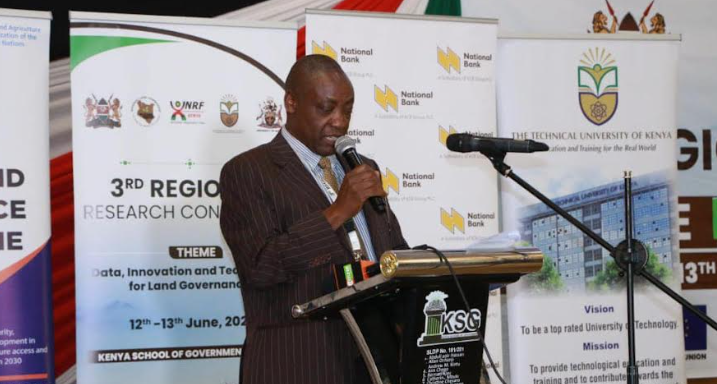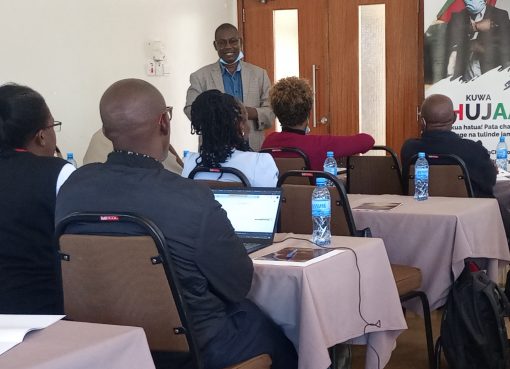The National Land Commission (NLC), in collaboration with the Ministry of Lands and Physical Planning, has made significant strides in digitising land records and creating robust land information systems.
NLC Chairman Gershom Otachi said that one of their flagship initiatives, an integrated Land Management Information System (LMIS), is a one-stop portal for all land-related services, including critical data on land ownership, usage, registration, valuation, and dispute resolution, that not only makes it easier for citizens to access land services but also improves coordination among different government agencies involved in land management.
Otachi, speaking at the Kenya School of Government (KSG) Kabete on Wednesday during the official opening of the 3rd Regional Research Conference themed “Data, Innovation, and Technology for Land Governance,” said that the digitization of land records and services is and will be a key priority for the National Land Commission.
“Innovation is the driving force behind change and improvement in land governance. The world is adopting innovative approaches that streamline processes, reduce costs, and improve service delivery,” highlighted the chairman.
Otachi said that blockchain technology is one of the innovations being used to enhance land registration and title management, explaining that it offers a secure and transparent way to record land transactions, reducing the risk of fraud and disputes.
“By piloting blockchain projects in land registration, we can build trust in our land administration systems and protect the rights of landowners,” he said.
The chairman explained that remote sensing and drone technology are being leveraged for land surveying, monitoring, and data collection. These technologies provide high-resolution imagery and real-time data, essential for accurate land assessment and management.
“Data collection is only the first step. We must also ensure that this data is accessible and usable by all stakeholders, from government agencies and private sector partners to local communities and individual citizens. This requires investment in data infrastructure, capacity building, and policies that promote open data and information sharing,” said Otachi.
NLC Chief Executive Officer (CEO) Kabale Tache said that Article 67(2)(d) of the Constitution of Kenya and the National Land Commission (NLC) Act 2012, Section 5(1)(d), mandates the NLC to undertake research related to land and the use of natural resources, and make recommendations to the appropriate authorities.
“It is on this basis that we are holding this conference, this being the third edition in a series of research conferences the Commission has organised since 2021,” she explained.
Ms. Tache said that in today’s rapidly evolving world, the management and governance of land have become increasingly complex, requiring them to embrace new technologies to ensure sustainable and equitable land use.
“The use of data, innovation, and technology has the potential to revolutionise how we manage and govern land, making processes more efficient, transparent, and inclusive,” said Ms. Tache.
She continued: “As we embrace these advancements, we must also be mindful of the challenges that come with them. Data privacy, security, and accessibility are crucial considerations that must be addressed to ensure that the benefits of data innovation and technology are equitably distributed among all stakeholders.”
She called for collaboration from all stakeholders, asking them to keep in mind the importance of their work and the impact it can have on the lives of people around the world.
“Together, we have the opportunity to shape a more sustainable future for land governance, and I am confident that our collective efforts will lead to meaningful and lasting change,” said Ms. Tache.
By Joseph Ng’ang’a





